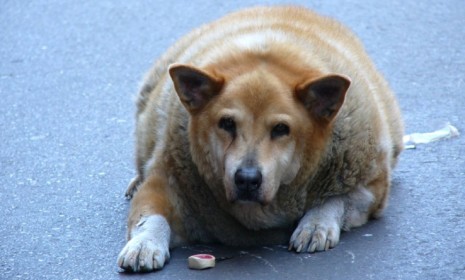America's first pet-obesity clinic: A guide
We the people aren't the only Americans who are overweight. Our dogs and cats could stand to shed some pounds, too. And now they can get help

A free daily email with the biggest news stories of the day – and the best features from TheWeek.com
You are now subscribed
Your newsletter sign-up was successful
American men, women, and children aren't the only ones losing the battle of the bulge. Studies suggest that many of our dogs and cats are obese, too. How are we to confront the rising problem of pet obesity? With a pet obesity clinic, of course. Cummings School of Veterinary Medicine at Tufts University in Massachusetts has opened the nation's first weight-loss center catering exclusively animals. Will a pet obesity clinic really help our chubby pets? Here, a brief guide:
How overweight are U.S. pets?
They're even fatter than we are. Studies show that up to 60 percent of the dogs and cats in the U.S. qualify as obese, while only 35 percent of their human counterparts do. That's a lot of wheezing, huffing, puffing Labradors.
The Week
Escape your echo chamber. Get the facts behind the news, plus analysis from multiple perspectives.

Sign up for The Week's Free Newsletters
From our morning news briefing to a weekly Good News Newsletter, get the best of The Week delivered directly to your inbox.
From our morning news briefing to a weekly Good News Newsletter, get the best of The Week delivered directly to your inbox.
Is this really such a big deal?
Yes. Obesity can lead to potentially deadly health problems in animals as surely as it can in humans. Dogs and cats aren't prone to coronary artery disease, which is a leading obesity side effect in humans, but extra pounds increase pets' risks of breathing problems, diabetes, and joint problems, reducing the animals' quality of life and life expectancy.
How will this clinic work?
The vets at Tufts say it can be hard for doting pet owners to say no when their animals beg for food, so people need proper training as much as dogs and cats do. The clinic aims to treat 600 patients annually by 2015, researching new methods to prevent and treat pet obesity, and teaching owners how to make sure their dogs and cats get proper nutrition, while helping them figure out how to find time in their busy schedules to exercise their pets. That might mean there's a hidden benefit in this for the humans, too. A 2006 study at Northwestern Memorial Hospital's Wellness Institute found that overweight pets can encourage their overweight owners to go outside and exercise with them, so everyone, on four legs and two, winds up losing weight.
A free daily email with the biggest news stories of the day – and the best features from TheWeek.com
Sources: Business News, Examiner.com, Huffington Post, Jezebel